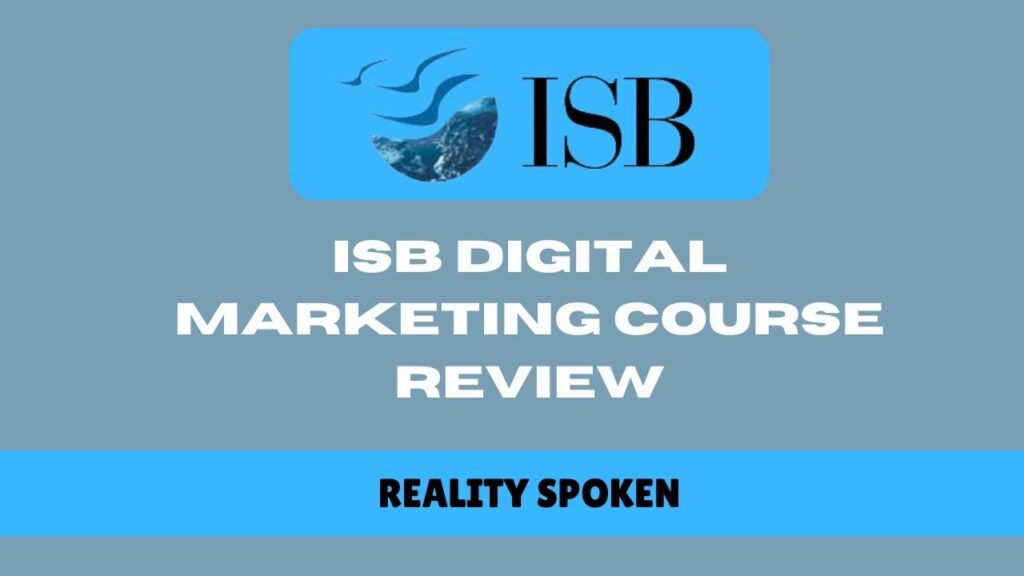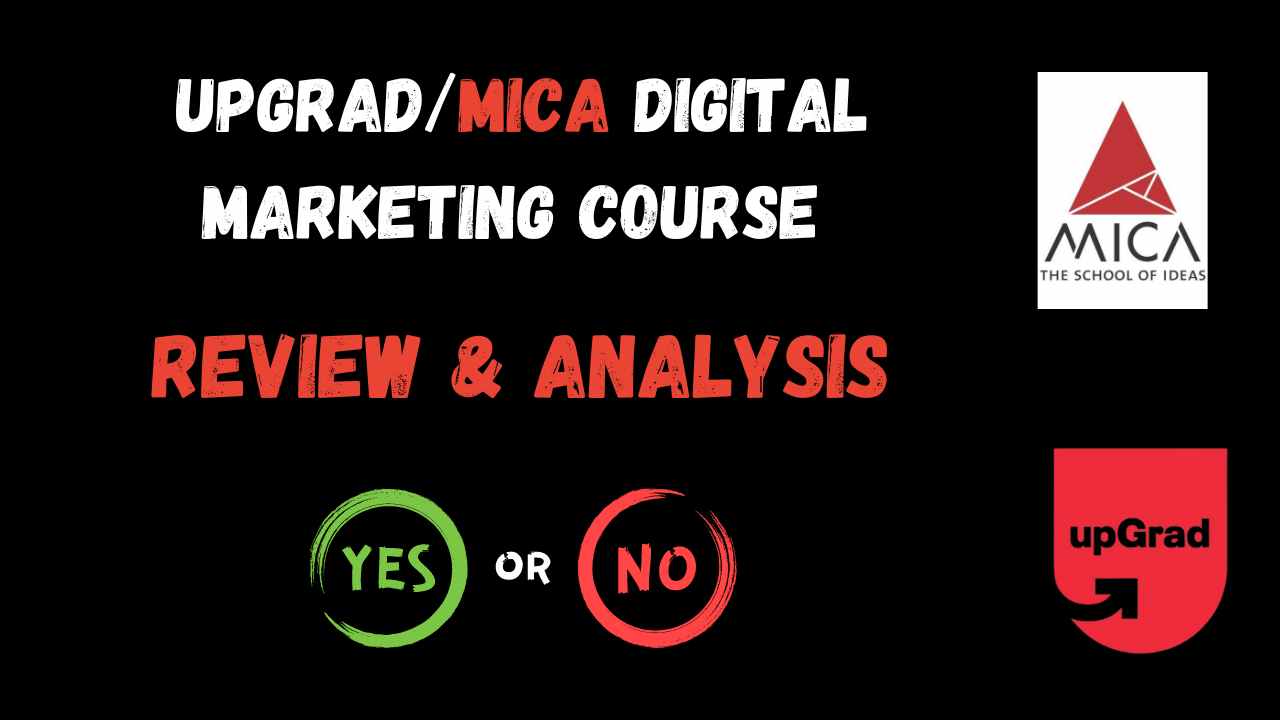ISB‘s executive programs are said to be ranked #1 in India and #32 globally in the Financial Times (FT) Executive Education Custom 2022 Ranking, but are they worth it and provide proper value for Digital Marketing Course, let us find out here.
Digital marketing is critical today because almost everyone uses the internet. People have become digitalized. So the importance of digital marketers has also increased. Digital marketing helps companies reach a large audience quickly and effectively, so there is a lot of potential
ISB Digital Marketing Course: Overview, Key Highlights, Syllabus, Fees, Review

- Course Name: Digital Marketing and Analytics
- Mode Of Learning: Online
- Duration: 12 weeks
- Eligibility: Any Graduate / Diploma holder
ISB Digital Marketing Course Overview
Professionals & Students looking to improve their digital marketing skills can enroll in ISB Executive Education’s 12-week online course, “Digital Marketing and Analytics,” which begins on June 27, 2024. More than 200 pre-recorded films, work-related projects, and real-world case studies from well-known companies like Nike and Airbnb will be presented to participants. Important topics covered in the curriculum include social media advertising, email marketing, SEO, paid advertising campaigns, and developing technologies used in industries.
ISB Digital Marketing Course Key Highlights
- #1 B-school in India#31 B-school Globally#5 B-School in Asia (Source: FT Global MBA Ranking 2024)
- 200+ Pre-recorded Videos for Self-paced Learning from Top ISB Faculty
- 20+ Practical Assignments, Hands-on Projects with Top Brands, and Quizzes10+
- Real World Case Studies on Top Brands5+ Masterclasses on ChatGPT, AI for Personalized Marketing, Market Research, and More
- Create, Manage, and Monitor Simulated Campaigns with Stukent10+
- Discussions with Experts
- ISB faculty will not be a part of weekly live sessions or any other live interaction in this program
ISB Digital Marketing Course Syllabus
| Module | Topics | Details |
|---|---|---|
| Module 1: Marketing in the Digital World | Definition, Growth & Benefits of Digital Marketing | Digital marketing involves online methods to promote products. It’s growing rapidly and offers measurable benefits. |
| Traditional vs Digital Marketing | Traditional uses offline channels (TV, print); digital uses online channels (social media, search engines). | |
| Relationship & Benefits Over Traditional Marketing | Digital marketing complements traditional methods but offers better targeting and analytics. | |
| Positioning Challenge & Marketing Crisis | Adapting to digital trends can be difficult; requires strategic rethinking. | |
| Module 2: Digital Strategy and Analytics | Transformation of 4Ps in Digital Space | Product, Price, Place, Promotion are now more dynamic and personalized. |
| Utilizing Digital Opportunities to Create Value | Leverage online tools for customer engagement and business growth. | |
| The “Long-Tail” Effect | Digital platforms allow niche products to find an audience. | |
| Customer Personas & Segmentation | Detailed profiles of ideal customers used to target specific market segments. | |
| Digital Marketing Funnel | Steps guiding potential customers from awareness to purchase; used for strategic planning. | |
| Module 3: Customer in the Digital World | Privacy vs Personalization Debate | Balancing user data privacy with personalized marketing; affects strategy. |
| Customer Behavior in Digital Domains | Easier access to information, faster decision-making. | |
| Peer Influence in Purchase Process | Social proof and recommendations impact buying decisions. | |
| Customer Networks in Digital Marketing | Utilizing online communities to enhance marketing. | |
| Customer Journey | Mapping the steps customers take from awareness to purchase. | |
| Module 4: Reaching and Engaging the Customer | P-O-E-M Framework | Paid, Owned, Earned Media for reaching and engaging customers. |
| Integrating Offline with Online Channels | Enhances customer engagement through multi-channel strategies. | |
| Reaching and Engaging the Customer | Tactics for effective customer interaction online. | |
| Build an Engaging Social Media Marketing Strategy | Leveraging social listening to create effective social media strategies. | |
| Module 5: Strategies for Paid Ad Campaigns | Planning Framework for Paid Ad Campaigns | Structured approach to creating and managing paid ads. |
| Key Insights in PPC | Examples highlighting effective pay-per-click advertising strategies. | |
| Ecosystem of Google Ad Campaigns | Overview of Google Ads, display, social media, and email ad environments. | |
| Managerial Decisions for Ad Campaigns | Factors to consider: budget, targeting, metrics. | |
| Module 6: Email, Display, and Social Media Advertising | Email and Social Media Marketing Strategies and Their Execution | Strategies and best practices for online advertising channels. |
| Data Requirements for Different Platforms | Understanding the data needs for various digital platforms. | |
| Integrating Offline with Online | Enhancing marketing strategies by combining offline and online efforts. | |
| Optimizing Campaigns Using Data Analytics | Using data analytics to optimize campaigns. | |
| Module 7: Emerging Technologies for Digital Marketing | New Technologies and Marketing Transformations in Digital Environments | Impact of AI, IoT, and robotics on marketing. |
| Data Strategies for Marketing | Utilizing data to inform and improve marketing strategies. | |
| Impact of AI on Marketing | Future trends and changes in consumer behavior due to AI. | |
| Module 8: Stukent Mimic Pro Simulation | Stukent Mimic Pro Simulation – 1 Round | Practical exercise simulating real-world digital marketing scenarios. |
| Module 9: Stukent Mimic Pro Simulation | Stukent Mimic Pro Simulation – 2 Round | Additional practical exercise for advanced digital marketing scenarios. |
| Module 10: Case Studies and Real-World Applications | Case Study: Digital Marketing Funnel Strategy | Real-world example showing effective funnel implementation. |
| Case Study: Creating Value for Customers | Example of effective customer value creation. | |
| Analyze Digital Marketing Strategies of a Few Brands | Reviewing and learning from successful digital marketing strategies. |
ISB Digital Marketing Course Fees
- Program Fee: ₹1,08,000
- GST will be charged at checkout
For further clarification and fee concession, you can contact
- ISB referral code– Click Here
- Contact Info– 7735361649
ISB Digital Marketing Course Review
Advantages
- Syllabus are in-depth
- High-class instructors
- 24/7 support
- This is for candidates who are looking into easy ways in
Disadvantages
- Duration is very short for the fee paid
- The course fee is high
ALSO READ: Delhi School Of Internet Marketing Course Review
Check Out-


